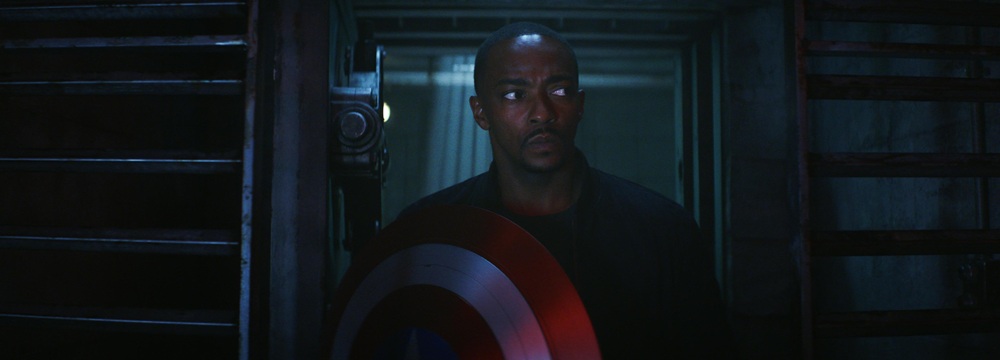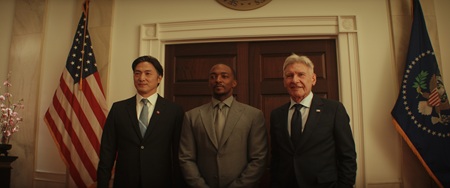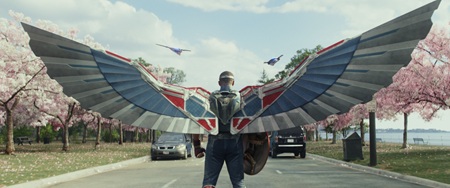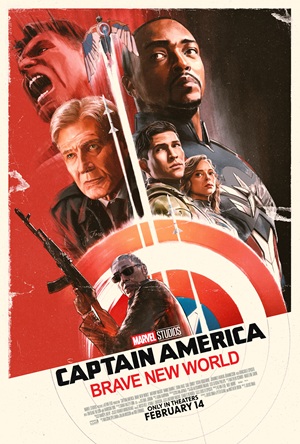
Captain America: Brave New World (2025)
by Sara Michelle Fetters - February 14th, 2025 - Movie Reviews
Brave New World Leaves Captain America Stranded in Neutral
Reviewing Captain America: Brave New World is a lose-lose proposition. It has legitimate issues. And even more vexing, its strongest aspects don’t hold up that well. As far as the Marvel Cinematic Universe (MCU) is concerned, it’s strictly middle of the road: not bad enough to be upsetting but nowhere good enough to be worthy of a rewatch (let alone reconsideration).
The issue is that, based purely on current events, the level of vitriol coming from the worst corners of the public echo chamber are going to be massive, given the actor (Anthony Mackie) who has now taken up the mantle of Captain America, and that major plot points revolve around diversity, equity, inclusion, racial injustice, and the dangers of voting a potential monster into the White House. That means that any sincere criticism will either be misconstrued or drowned out entirely, and that’s unfortunate, as there’s plenty here — good, bad, and ugly — deserving of an honest discussion.
This fourth entry in the Captain America superhero series begins with Sam Wilson (Mackie) still trying to determine whether carrying the shield Steve Rogers handed to him at the end of Avengers: Endgame — and becoming the signature superhero for the United States — is a burden he should have accepted. This becomes even more apparent after an assassination attempt is made on newly elected President Thaddeus Ross (Harrison Ford), for which former Super Soldier Isaiah Bradley (Carl Lumbly) — wrongly imprisoned for 30 years so government scientists could study him like a guinea pig — is framed and quickly reincarcerated.
From there, events spring into full-blown 1970s conspiracy-thriller territory à la Three Days of the Condor or The Parallax View, only with a more 21st-century cultural and political bent. The problem is that the film never has the strength of its convictions to meaningfully explore those tangents. It’s all elevator music and little else. The tune is familiar and it remains hummable, but there is also no lyrical nuance and, more egregiously, no soul.
Additionally, the feature’s advertising has already ruined its primary secret involving President Ross and the strange bouts of anger that seem to be about to overwhelm him. So what he will become is never in doubt, which gives the climax oddly little weight. It also does not help that this turn of events forces Wilson to become something of an age-old cinematic trope: an intelligent, accomplished, and dynamic Black man who is the “magical” savior of a lesser white man, potentially at his own expense.
Yet many of these flaws are somewhat mitigated, courtesy of the steady and confident hand of director Julius Onah (Luce, The Cloverfield Paradox). The opening action sequence featuring Wilson and his potential new replacement as The Falcon, Joaquin Torres (Danny Ramirez), is masterfully executed. A notorious criminal known only as Sidewinder (Giancarlo Esposito) has stolen a cache of adamantium from Celestial Island (the MCU is finally dealing with the giant petrified body of Tiamut from the climax of Eternals), and to avoid an international incident, President Ross has ordered Captain America to get it back.
It’s a stupendous opening set piece, beautifully filmed by cinematographer Kramer Morgenthau (Creed III) and featuring superb stunt choreography and expertly integrated special effects. Colors pop, and there is solid visual depth that’s typically not part of the MCU’s signature style. This same look and feel is present throughout, until (noticeably and annoyingly) a giant showdown between warships and aircraft at Celestial Island, at which point a muted, muddy visual aesthetic takes over. Until then, though, Onah does a fine job of making most of the film’s action crackle with electricity.
But the primary villain, Samuel Sterns (Tim Blake Nelson), returning to the overarching story for the first time since 2008’s The Incredible Hulk, is a drab letdown. He’s nowhere near as scary or sinister as intended. As for that climax pitting President Ross and Wilson against one another, it’s well-staged and reasonably thrilling, but it also lacks emotional vibrancy. Even the arrival of a key figure from the president’s past falls peculiarly flat, though it is nice to see this actor back in the MCU after 17 years.
Yet the biggest obstacles Captain America: Brave New World cannot overcome are the ones it builds its foundation on during its opening stretch. While the script brings questions of race, inequity, political injustice, and presidential overreach with bold dynamism, it does nothing substantive with them. It’s as if the whole thing is stranded in neutral, with no idea how to get the MCU back into high gear.
It’s a toothless attempt at topicality. Because of that, there’s little that feels very brave and even less that struck me as new. Instead, for all of Mackie’s magnetism and Ford’s thunderous dexterity, the film ends up being a lot of superhero comic-book status quo: well staged, easy to look at it, even thrilling in fits and starts. But none of it matters or has any lasting resonance, and that’s frankly a super-powered shame.
– Review reprinted courtesy of the SGN in Seattle
Film Rating: 2½ (out of 4)








